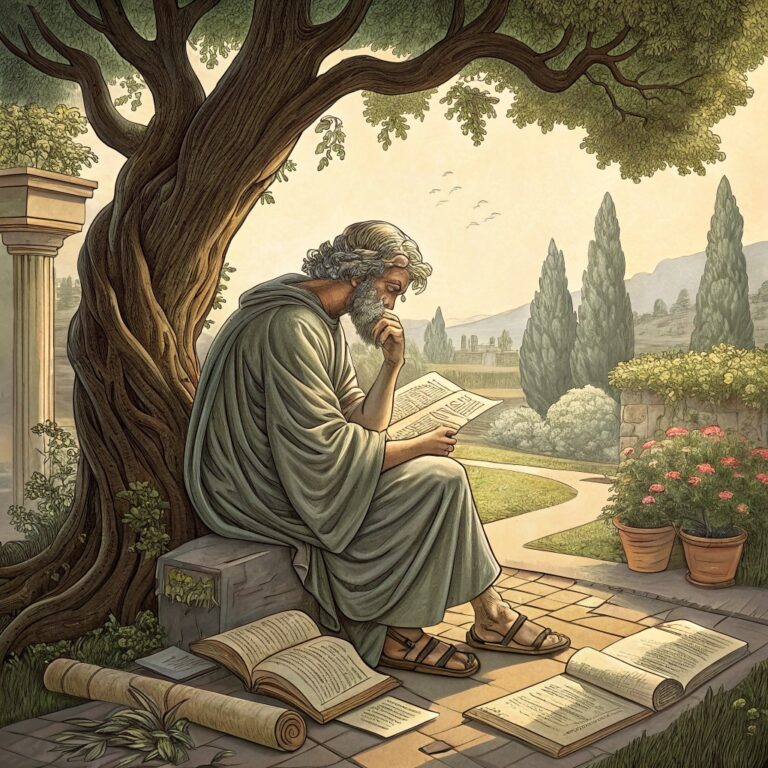
The Philosophy genre invites readers to slow down, think critically, and confront the fundamental questions of life. It’s a genre rooted in wonder and logic—challenging us to examine existence, ethics, truth, knowledge, and the human experience. From ancient dialogues to modern essays, philosophy shapes how we see ourselves and the world around us.
Far from being dry or detached, philosophy is deeply personal. It asks: What does it mean to live a good life? Can we ever be certain of anything? Do we have free will? Whether you’re drawn to moral dilemmas, metaphysical thought, or political theory, the Philosophy genre empowers you to think clearly and live more intentionally.
The Philosophy genre often explores:
Existence and Consciousness: What it means to be, to perceive, and to question.
Ethics and Morality: How we define right and wrong, and how we should live.
Logic and Epistemology: How we reason, argue, and acquire knowledge.
Political and Social Thought: Theories of justice, rights, freedom, and power.
Aesthetics and Meaning: What beauty is, why art matters, and how we interpret life.
Whether academic or accessible, philosophical books challenge readers to reflect, debate, and grow.
Writing in the Philosophy genre means diving into complex ideas—and making them resonate. Whether you’re unpacking ancient texts or offering a fresh lens on modern dilemmas, your job is to provoke thought, not preach. Here’s how to shape your manuscript:
Clarify Your Core Question or Theme
Philosophy begins with a question. Whether you’re exploring consciousness, justice, or identity, start with a compelling inquiry and build from there.
Define Your Approach (Analytic, Continental, Applied, etc.)
Will your work be logical and argument-based? Narrative and historical? Practical and real-world focused? Choose your framework and stick to it.
Make the Abstract Understandable
Use clear examples, analogies, and structured reasoning to bring lofty concepts down to earth. You’re guiding the reader—not losing them in jargon.
Engage With Existing Thinkers and Traditions
Whether you’re building on Kant, critiquing Nietzsche, or modernizing Confucianism, acknowledge the thinkers who’ve shaped your topic. Philosophy is a conversation across time.
Anticipate Counterarguments
Great philosophy strengthens its case by confronting opposing views. Anticipate objections, engage with them honestly, and clarify your position.
Encourage Reflection and Dialogue
End sections or chapters with thought-provoking questions or prompts. Let readers wrestle with the material, not just absorb it.
Balance Depth With Accessibility
You don’t need to sacrifice rigor to reach a wider audience. The best philosophy books are both intellectually honest and deeply readable.
These influential texts have shaped civilizations, sparked revolutions, and continue to provoke deep thought in readers across generations:
Meditations by Marcus Aurelius
Did you know? This timeless collection of Stoic reflections was never meant to be published—it was the emperor’s private journal on how to live wisely and justly.
The Republic by Plato
Did you know? One of the first and most influential works on justice, governance, and education, The Republic still sparks debate over the ideal society.
Thus Spoke Zarathustra by Friedrich Nietzsche
Did you know? This poetic and provocative work introduced concepts like the Übermensch and eternal recurrence—challenging readers to reimagine morality and meaning.
Being and Time by Martin Heidegger
Did you know? A cornerstone of 20th-century existentialism, this dense but profound book redefined how we think about existence, death, and authenticity.
The Ethics of Ambiguity by Simone de Beauvoir
Did you know? A key feminist and existentialist work, this book explores freedom, responsibility, and moral complexity through the lens of lived experience.
Explores how we define good and evil, right and wrong, and how we should act in a complex world.
Example: Groundwork for the Metaphysics of Morals by Immanuel Kant
Focuses on individual experience, freedom, anxiety, and meaning.
Example: The Myth of Sisyphus by Albert Camus
Tackles justice, liberty, power, and the role of the state.
Example: A Theory of Justice by John Rawls
Explores thought systems like Taoism, Buddhism, Confucianism, and Hinduism.
Example: Tao Te Ching by Laozi
Examines what it means to think, feel, and be self-aware.
Example: The Conscious Mind by David Chalmers
Ready to share your story?
Tell us what you need—we’ll help bring your book to life.
